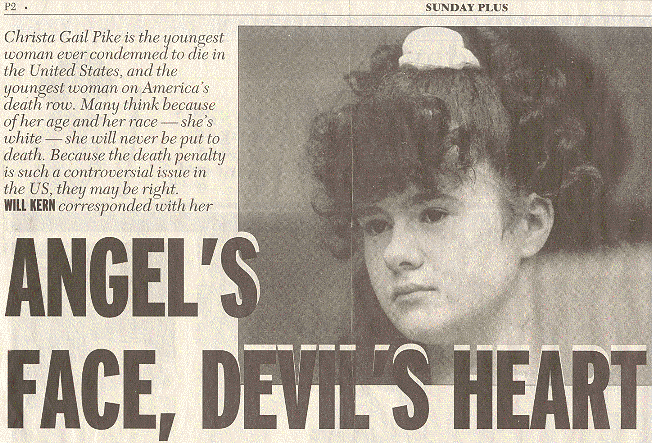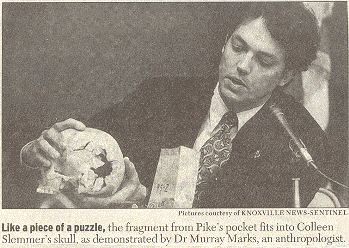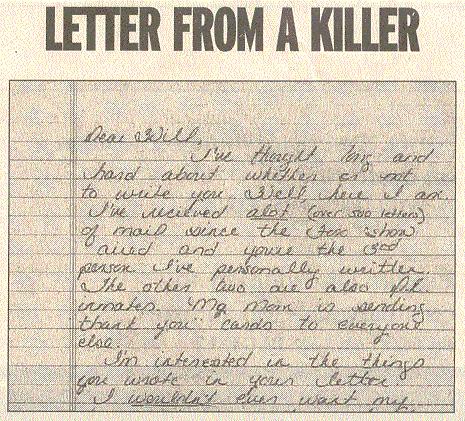Originally published in The Straits Times, April 22, 2001
SHE lives in a grey concrete
box. It is full of stuffed animal,
toys, family photographs and
trinkets depicting angels. She is
allowed one hour every day for
exercise. She is 24 years old.
She is sentenced to die.
The spartan 3 m by 3.5 m cell
at the maximum security prison
for women in Nashville,
Tennessee, is her last home.
There is virtually no chance that
Christa Gail Pike, 24, the
youngest woman on America's
death row, will ever leave prison
alive.
In 1996, the then 19-year-old
Pike was sentenced to die by
electrocution for an unspeakably
horrific crime.
But Pike has a face that
beguiles easily. Catherine Crier,
the host of an American
television news programme
called Fox Files, described her
as having a "sweet voice and
childlike manner."
A juror at Pike's trial put it better:
"She has an angel's face and a
devil's heart."
Florida, 19-year-old Colleen
Slemmer, was trying to steal her
boyfriend.
Those who knew Miss Slemmer
dispute this, but Pike was sure.
In the middle of January 1995,
she told Shipp: "That little whore
has to be taught a lesson."
She and her friend, Shadolla
Peterson, 18, concocted a plan to
lure Miss Slemmer to an
abandoned steam mill that is
part of the University of
Tennessee Campus.
The mill is close enough to walk
to, but deep in the woods,
secluded, and away from
civilization. No one was likely to
come upon them. Or hear
screaming.
On the night of Jan 12, 1995,
she told Miss Slemmer she
wanted to smoke marijuana with
her as a peace offering, to get
things straight between them.
Miss Slemmer agreed to a walk
in the woods. Before leaving,
Pike pocketed a box cutter and a
small meat cleaver.
Pike, Miss Slemmer, Shipp and
Peterson signed out of their
dormitory and headed out to the
mill, walking along a dark
jogging trail.
Once they were swallowed up
by the forest and completely
isolated, Pike began accusing
Miss Slemmer of trying to sleep
with her boyfriend.
The girl denied it, Pike became
outraged and kneed her in the
face. She pulled out the meat
cleaver and sliced Miss
Slemmer's' stomach, then Shipp
jumped in and gashed her
across the chest.
The victim begged her to stop,
but her cries fell on deaf ears.
The box cutter came out, and the
three others tortured Miss
Slemmer for the next 30 to 40
minutes, stabbing and slashing
her hundreds of times.
Eventually, the three got bored
with cutting, so Pike and
Shipp held her down and carved
a pentagram, the mark of the
devil, in her chest with the meat
cleaver.
The victim was still alive.
At the end, Pike up a chunk of
asphalt and smashed the girls
head with it, again and again.
And finally, after an hour of
torture she was dead.
Pike reached down fished a
piece of her skull out of the
gaping open hole in her head
and put the blood-soaked
fragment in her jacket pocket.
Court scenes just like TV's
DISTRICT ATTORNEY Jo Helm announced
that her office would seek the death penalty
for Christa Gail Pike. Assistant DA Bill
Crabtree was the other half of the
prosecution's team.
The opening gavel was on March 22, 1996.
One of the grimmer aspects of the trial was
Ms Helm and Mr Crabtree's introduction of
victim Colleen Slemmer's skull into
evidence.
University of Tennessee anthropologist
Murray Marks testified, with skull in hand,
that the fragment found in Pike's jacket fit
into Miss Slemmer's skull like a puzzle
piece.
But more dramatic was the testimony of
the coroner, Dr Sandra Elkins, when she
described the wounds on the body:
"Lacerations of the face and scalp, skull and
facial fractures, lacerations and contusions
of the brain, stab and slash wounds."
Pike cried quietly when Dr Elkins
described the wounds to the skull.
Next, the murderer's cold police station
confession was played to the jury: "I said,
'Colleen, do you know who is doing this to
you?' She was just going ah, ahhh. I told her
to shut up."
Pike was found guilty on both counts and
sentenced to death by electrocution for the
murder.
The conspiracy sentencing was set at a
later date, and Ms Helm said she would go
for the maximum.
Before the conspiracy sentencing, Pike
gave a TV interview to a local station from
her cell. She looked good on television, and
was very convincing as a lost, bewildered
teenager. To viewers, she did not look like
the monster the DA had made her out to be.
She told the reporter that even though
no one would forgive her, the Lord would
stand by her.
On June 6, 1996, she returned to the
courtroom full of confidence.
Assistant DA Crabtree called Ms Deborah
Wade, a jailer at Knox County, to the
witness stand.
Ms Wade testified that on March 30, 1996,
just after Pike was sentenced to die, the girl
sat in the jail's holding cell and wrote a
letter to her boyfriend, Shipp.
Pike gave it to Wade to put in the jail's mail,
but the jailer passed it to her supervisor,
who gave it to the DA.
Then, in a scene right out of TV's The
Practice, Mr Crabtree read the letter out loud:
"Hey Love: I just want to you to know how
much I love you! I have 10 months left to
live! Imagine that! I'd spend every moment
with you if I could! Baby! I want you to tell
them you lied in your statement and go
along with mine! K?
"Please write me! I miss you so much! Ya
see what I get for tryin' to be nice to that
hoe? I went ahead and bashed her brains
out so she'd die quickly instead of letting her
bleed to death and they f***ing fry me! Ain't
dat some shit? Please write me and tell me
what you're feeling! Also, tell your lawyer if
he wants me to testify for you, I will! Love
you for the rest of my life! Lil Devil".
The courtroom was silent. Stunned.
She was given the maximum
sentence - 25 years - on the conspiracy
charge.
The note Pike sent in reply to Kern's letter.
ON JULY 23,1998, I saw a profile of Christa Pike on the American TV newsmagazine, Fox Files. She
looked like a young woman who felt a terrible guilt, terrible pain and remorse for what she had done.
She seemed to be searching for an answer as to why she did what she did, and for some kind of
forgiveness.
Forgiveness and redemption have always been a strong through-line in my work as a playwright, and
Pike's television face convinced me that she was a woman who wanted to heal.
As much as I would like to say my motives for contacting her were altruistic, I can't. I saw a play in her
story. But I also knew that if she didn't want me to use it, I wouldn't.
So I wrote her a letter.
"Dear Christa: I am writing to you because I saw your story last night on Fox. I've always been interested
in the nature of evil, and while I don't think you are an evil person, what you did was very evil. The question
I have is the same one you have: Why? What pushed you over the line? What happened?..
"I would like to talk to you about it or correspond with you if you'd be interested. If you're serious about
discovering the Why? of your crime, and indeed your life, I encourage you to get in touch with me. I think
that much I can help you with. Will Kern. "
Looking back on it, this is an absolutely ridiculous statement to make. I am not qualified to help her in
any way. What she needs is a professional psychiatrist, not me. But I saw a wounded soul on that show,
and something made me want to reach out to her. Foolish, probably, but that's what I felt like at the time.
I sent the letter, not sure if I would hear back from her. Three weeks later, I did.
"Dear Will: I've thought long and hard about whether or not to write you. Well, here I am. I've received A
LOT (over 500 letters) of mail since the Fox show aired and you're the 3rd person I've personally written...
"If you're serious about wanting to HELP me and not only interested in satisfying your own curiosities,
then I'm willing to let you. I honestly want to know the 'why?'! Sincerely, Christa."
I wrote back to her and told her that the first thing she needed to do, before anything else, was to take the
blame for what she did, and not blame Colleen Slemmer.
I never heard from her again. - WILL KERN
THE TWISTED ROAD
TO DEATH ROW
In 1995, Pike, a high-school
dropout from a broken home,
was studying computer
programming at a Job Corps in
Knoxville, Tennessee.
Job Corps is a US government
programme that helps
disadvantaged youth try and turn
their lives around by offering
career training. Students live in
dormitories in its campus
environment. Often, however, it
is a hotbed of criminal activity.
Pike, who is white, met and fell
in love with another Job Corp
student, a black youth named
Tadaryl Shipp, 17. They began
dabbling in the occult and devil
worship.
Pike became convinced that a
Job Corps student from
TEARS AT THE TRIAL
THE three were arrested within
36 hours.
Pike had been telling friends
and showing the piece of the
skull. The police also looked at
the log book and saw the four of
them signed out together, and
only three returning.
The police took the trio in for
questioning. Shipp's room was
searched, and a Satanic Bible
and altar were found. A search of
Pike's jacket turned up the piece
of Miss Slemmer's skull.
They questioned Pike, but she
insisted she was only trying to
scare the girl, and It got out of
hand.
But the case against her was
solid, and her trial for murder and
the conspiracy to commit murder
began on March 22, 1996 (see
report below).
She cried throughout the
proceedings, but the jury was not
to be moved.
She was found guilty on both
counts after only 2 1/2 hours of
deliberation. On March 30, 1996,
she was sentenced to death by
electrocution on the murder
charge, and on June 6, 1996,
she was given 25 years for
conspiracy.
Shipp was given a life sentence
with the possibility of parole, and
Peterson got probation after
pleading guilty to being an
accessory after the fact.
THE CONTROVERSY
RAGES ON
ONLY 38 states in the US have
the death penalty currently, but
the issue is hotly debated all over
the country. Advocates say it
deters crime. Detractors say it is
a racist system that targets
blacks. Blacks make up 42 per
cent of those on Death Row, in
spite of making up only 12 per
cent of the US population.
Most often, a black is given the
death penalty when the crime
involves murder of a white.
The death penalty is or is not a
deterrent to crime, depending on
who interprets the statistics.
When police chiefs were polled
all over the US, only 1 per cent
said the death penalty is an
effective deterrent.
American judges do not like to
sentence women to die. While
women make up 13 per cent of
suspects arrested for murder,
only 2 per cent get death
sentences, and only 3 per cent of
women on Death Row have been
executed since the institution
began.
It is unlikely Pike will face an
executioner.
The state of Tennessee has put
only two inmates to death since
1960, and both were men. Pike
has years of appeals in front of
her.
Miss Slemmer's family has tried
to have the skull released from
the coroner's custody so they can
cremate it and scatter the ashes,
as they did with the rest of her
body.
But it is evidence.
The skull will remain locked
away until the appeals process
has run its course.
During this time, Pike will sit in
her cell, stare at the walls, and
wait.
The writer is the author of the play
Hellcab and a sub-editor with
Life! and Sunday Plus



